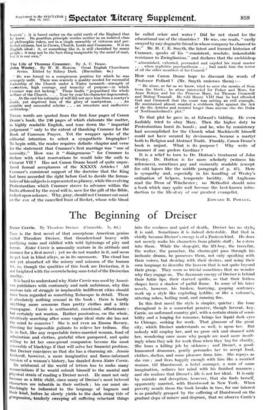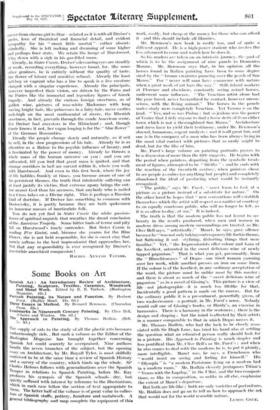The Beginning of Dreiser Sister Carrie. By Theodore Dreiser. (Constable.
7s. 6d.) Tilts is the first novel of that amorphous American genius called Theodore Dreiser, that thundercloud heavy with purifying rains and riddled with wild lightnings of pity and terror. Sister Carrie is unusually mature in its attitude and manner for a first novel ; yet we do not wander in it, and seem to get lost in blind alleys, as in its successors. The cloud has not yet absorbed all the misery and miasma of the human lot, so, though the qualities of this book are Dreiserian, it is not freighted with the overwhelming sum-total of the Dreiserian quality.
It is hard to understand why Sister Carrie was used by Ameri- can publishers with contumely and rank unfairness, why this anxious tale of struggle in implacable indifferent cities should have been regarded as something Zolaesque in detail. There is absolutely nothing sensual in the book ; there is hardly anything more sensuous than pretty clothes and a little champagne. Carrie is sentimental, emotional, affectionate ; but certainly not wanton. Rather passionless, on the whole, intuitively searching after some vague ideal state she has not the mind to conceive ! She is not even an Emma Bovary, thirsting for impossible gallants to relieve her tedium. She is. in fact, like any respectable twice-married woman, fond of admiratiort and clothes, grateful when pampered, and quit willing to let her once-proud companion become the most miserable of blacklegs if that will solve her financial problem: But Dreiser convinces us that she has a charming air. Jennie Gerhardt, however, a more imaginative and flame-informed version of a woman's history, has dazzled down Sister Carrie. An aristocrat of the world of letters has to make many renunciations if he would submit himself to the mental and Physical strain of reading a Dreiser novel. He must not only become as a little child, since many of Dreiser's most beloved eh erecters are infantile in their outlook ; his ear must un- flinchingly be indurated to the language of bagmen and their kind, before he slowly yields to the dark rising tide of compassion, tenderly sweeping all suffering reluctant things
into the coolness and quiet of death. Dreiser has no style; it is said. Sometimes it is indeed detestable. But that is chiefly because Dreiser's energy is of a Protean kind. He does not merely make his characters from pliable stuff ; he eaters into them. While the shop-girl, the lift-boy, the traveller, the waiter, the preacher, the chorus-girl pass through his inchoate drama, he possesses them, not only speaking with their voices, but desiring with their desires, and using their own language to describe the heaven that is not quite beyond their grasp. They seem so trivial sometimes that we wonder why they engage us. The daemonic energy of Dreiser is behind their futile lips, their starved spirits, so that their listless shapes have a shadow of pallid flame. In some of his later novels, however, his broken, hurrying, gasping sentences work up a style like exploding lyddite, or like a volcano's, uttering ashes, boiling mud, and running fire.
In this first novel the style is simpler, quieter : the tone throughout is in a somewhat pensive, though fervent, key. Carrie, an unformed country girl, with a certain strain of sensi- bility and a longing for romance, brings her liquid dark eyes to Chicago, seeking for work. That glamour of the great city, which Dreiser understands so well, is upon her. But nobody will employ her, and we grow sick and shamed with her, wondering once more why people are used more insult- ingly when they ask for work than when they beg for charity, She loses a killing job by sickness ; and Drouet, a good- hiunoured drummer, gently persuades her to accept food, clothes, shelter, and some pleasure from him. She repays as she can ; and lives happily enough with hint like a married woman, till Hurstwood, a hotel manager, a man of some imagination, seduces her mind with his finished manners ; and she realizes that Drouet's life is not her ideal. It is only by mistake and deception, however, that she finds herself, apparently married, with Hurstwood in New York. When poverty assails them the book breaks in two, for our interest is so painfully grasped by the suffering of Hurstwood on the gradual slope of misery and disgrace, that we observe Carric's career from chorus-girl to Star—related as it is with all Dreiser's gusto, love of theatrical and financial detail, and evident
sympathy for his " sweet little mortal "—rather absent- mindedly. She is left rocking and dreaming of some higher and perhaps finer state. We retain the image of Hurstwood, lying down with a sigh in his gas-filled room.
Already, in Sister Carrie, Dreiser's devouring eyes arc steadily at work, recording everything, hoWever banal, for, like some
other geniuses, he. is entirely without the quality of taste,
line floWer of leisure and sensitive refusal. Already the least hell-boy or vagrant who has a line to speak is a live creature charged with a singular experience. Already the principals, however imperfect their vision, are driven by the Fates and the Furies like the immortal and legendary figures of Greek tragedy. And already the curious foreign sweetness, as of golden wine, pictures of rose-white Madonnas with long waving bright hair, like princesses in a fairy-talc, naive castles rock-high on the most sentimental of rivers, the Rhenish sweetness, in fact, prevails through the crude American scene. For Dreiser had ancestors in the Rhineland ; and, though Carrie knows it not, her vague longing is for the " blue flower" of the German Romantics.
Already the people change slowly and naturally, as if cell by cell, in the slow progressions of his tale. Already he is as attentive as a Balzac to the psychic influence of luxury, and is fascinated by the power of money. Already he thrusts a whole mass of the human universe on you ; and you are suffocated, till you find that great mass is ignited, and that strange corridors in hell are carved within it, where you walk with Hurstwood. And even in this first book, where the joy
of life babbles frankly at times, you become aware of one of
his persistent themes, the truth that intolerable suffering can at least justify its victim, that extreme agony brings the out-
law nearer Cod than his accusers, that anybody who is nailed to a Cross takes on a Divine right. This is perhaps a Russian kind of doctrine. If Dreiser has something in common with Dostoevsky, it is partly because they are both spokesmen for immense masses of inarticulate folk.
You do not yet find in Sister Carrie the white passion- flower of spiritual anguish that wreathes the dread conclusion of the American Tragedy. Some bitter buds of terror and pity fall on Hurstwood's lonely surrender. But Sister Carrie is reading P(Ire Goriol, and, because she yearns for the Blue Flower, she is not held responsible, for she is sweet clay that merely softens to the best impressionist that approaches her. Not that any responsibility is ever recognized by Dreiser's irresistible anarchical compassion ! •
RAC9n•:L AN NAN D TAYLOR,



























































 Previous page
Previous page